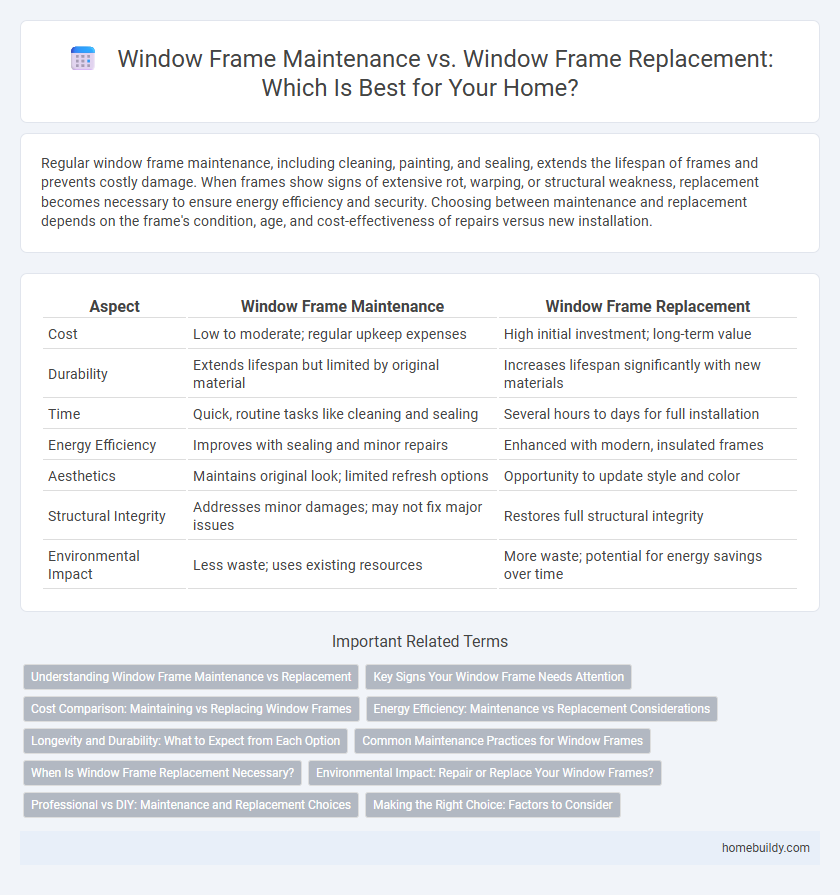Regular window frame maintenance, including cleaning, painting, and sealing, extends the lifespan of frames and prevents costly damage. When frames show signs of extensive rot, warping, or structural weakness, replacement becomes necessary to ensure energy efficiency and security. Choosing between maintenance and replacement depends on the frame's condition, age, and cost-effectiveness of repairs versus new installation.
Table of Comparison
| Aspect | Window Frame Maintenance | Window Frame Replacement |
|---|---|---|
| Cost | Low to moderate; regular upkeep expenses | High initial investment; long-term value |
| Durability | Extends lifespan but limited by original material | Increases lifespan significantly with new materials |
| Time | Quick, routine tasks like cleaning and sealing | Several hours to days for full installation |
| Energy Efficiency | Improves with sealing and minor repairs | Enhanced with modern, insulated frames |
| Aesthetics | Maintains original look; limited refresh options | Opportunity to update style and color |
| Structural Integrity | Addresses minor damages; may not fix major issues | Restores full structural integrity |
| Environmental Impact | Less waste; uses existing resources | More waste; potential for energy savings over time |
Understanding Window Frame Maintenance vs Replacement
Window frame maintenance involves regular cleaning, sealing, and minor repairs to extend the lifespan of existing frames and improve energy efficiency. Replacement becomes necessary when frames show signs of rot, warping, or structural damage that compromises insulation and security. Evaluating the condition of materials such as wood, vinyl, or aluminum helps determine the cost-effectiveness and long-term benefits of maintenance versus complete window frame replacement.
Key Signs Your Window Frame Needs Attention
Key signs your window frame needs attention include visible cracks, rotting wood, and peeling paint, which often indicate structural damage or moisture intrusion. Warped or swollen frames can hinder window operation, while drafts and increased energy bills suggest compromised seals requiring maintenance or replacement. Regular inspections of these indicators help determine whether timely repairs suffice or full window frame replacement is necessary to preserve home energy efficiency and security.
Cost Comparison: Maintaining vs Replacing Window Frames
Maintaining window frames typically costs 10-30% of the price of full replacement, making it a budget-friendly option for preserving functionality and appearance. Replacement expenses average between $300 and $1,000 per window frame, influenced by materials such as wood, vinyl, or aluminum. Long-term maintenance can extend frame lifespan by 5-10 years but may incur higher costs if frequent repairs are needed, while replacement offers improved energy efficiency and durability with higher upfront investment.
Energy Efficiency: Maintenance vs Replacement Considerations
Regular window frame maintenance, such as sealing gaps and repainting, improves energy efficiency by preventing drafts and heat loss, thereby reducing heating and cooling costs. However, replacing older, deteriorated window frames with modern, energy-efficient materials like fiberglass or vinyl can offer more significant energy savings through enhanced insulation and durability. Evaluating factors like frame condition, insulation quality, and potential energy cost savings helps determine whether maintenance or replacement is the best option for optimizing energy efficiency.
Longevity and Durability: What to Expect from Each Option
Regular window frame maintenance extends the lifespan by preventing rot, warping, and material degradation, ensuring frames remain durable over time. Replacement offers a fresh start with modern materials like vinyl or fiberglass, providing enhanced longevity and resistance to weathering. Expect well-maintained wood frames to last 20-30 years, while new vinyl or fiberglass frames can exceed 50 years with minimal upkeep.
Common Maintenance Practices for Window Frames
Common maintenance practices for window frames include regular cleaning to remove dirt and debris, inspecting for signs of rot or damage, and applying sealants or paint to protect against weathering. Lubricating hinges and locks ensures smooth operation and extends the lifespan of the hardware. Timely maintenance can prevent costly repairs and delay the need for full window frame replacement.
When Is Window Frame Replacement Necessary?
Window frame replacement is necessary when frames exhibit extensive rot, warping, or structural damage that compromises window functionality and energy efficiency. Visible signs such as cracking, persistent condensation between panes, and difficulty in opening or closing indicate that maintenance is no longer sufficient. Professional assessment helps determine whether repair can restore integrity or if full replacement ensures long-term durability and improved insulation.
Environmental Impact: Repair or Replace Your Window Frames?
Repairing window frames significantly reduces environmental impact by conserving resources and minimizing waste compared to full replacement. Repair processes typically use less energy and generate fewer greenhouse gas emissions, preserving the embodied carbon of existing materials. Opting for repair over replacement supports sustainability goals by extending the lifespan of window frames and reducing landfill contributions associated with frame disposal.
Professional vs DIY: Maintenance and Replacement Choices
Professional window frame maintenance ensures proper sealing, structural integrity, and extends frame lifespan by using specialized tools and materials, minimizing risks of damage and costly repairs. DIY maintenance may save money initially but often lacks precision, leading to potential issues such as water infiltration or warping over time. When replacement is necessary, professional services guarantee accurate measurements and installation, enhancing energy efficiency and durability compared to typical DIY methods.
Making the Right Choice: Factors to Consider
Evaluating window frame maintenance versus replacement depends on factors such as the frame's current condition, material type, and long-term energy efficiency goals. Wood frames with minor rot or warping may benefit from targeted repairs and refinishing, preserving aesthetics while controlling costs. Conversely, severely damaged frames or those with compromised insulation often require replacement to enhance durability, improve thermal performance, and increase property value.
window frame maintenance vs window frame replacement Infographic

 homebuildy.com
homebuildy.com